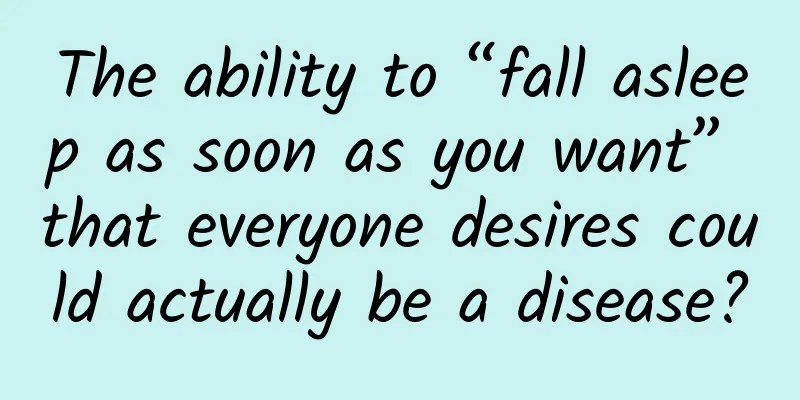The ability to “fall asleep as soon as you want” that everyone desires could actually be a disease?

|
When it comes to sleep, most people probably want to "go to sleep whenever they want", but is this kind of sleep necessarily good? The answer is no. This state of "going to sleep whenever they want" and "falling asleep as soon as they lie down" may be a rare disease called "narcolepsy". What kind of sleep can be called "good sleep" Generally speaking, good sleep often means a complete sleep cycle. Sleep is a complete sleep cycle that changes periodically and dynamically, including 20% of "rapid eye movement sleep (REM)" and 80% of "non-rapid eye movement sleep (NREM)". The International Academy of Sleep Medicine divides sleep into five stages, each lasting about 80-100 minutes. Too short a sleep time will destroy the integrity of the sleep cycle, thus affecting sleep quality. Therefore, ensuring sleep time is an effective way to improve sleep quality. Usually, we can also use the following 5 criteria to evaluate whether we have a good sleep. 1. Does it take more than 30 minutes to fall asleep? Can you get 6-9 hours of sleep every day? Generally speaking, if we fall asleep within 30 minutes, it is basically a normal and fast sleep. If we fall asleep in a few minutes, it may be too tired or it may be narcolepsy. But if it takes more than an hour and we still can't fall asleep, it may be too many troubles, causing psychological anxiety, slow sleep or insomnia. At the same time, we can get 6-9 hours of sleep every day. 2. Is the dream endless? Normal people will dream, but sometimes they will remember their dreams, which are basically not nightmares, and they will not wake up or wake up occasionally, which is a normal phenomenon. However, if you feel that you are dreaming from the time you fall asleep to the time you wake up in the morning, and you often have nightmares, or you wake up because of dreams during sleep, making it difficult to fall asleep again, this means that your sleep quality is poor. 3. Can you get up in a few minutes in the morning? Some people wake up in the morning and have the habit of staying in bed, unwilling to get up, wanting to rest in bed for a while longer, always feeling that they have not slept enough, and when they get up, they are not in a good mental state and always feel tired, which means that the quality of sleep is not high. Those who wake up and can get up within a few minutes, feel relaxed and in a good mental state, generally have a high quality of sleep. 4. Is the work efficiency good? Poor sleep quality will directly affect the next day's work efficiency. If you are very energetic and fully engaged in work the next day without feeling sleepy, it means that your sleep quality is good. On the contrary, if you have difficulty concentrating, memory loss, forgetfulness at work, and are always drowsy, it may be that your sleep quality is poor. 5. Do you often wake up in the middle of the night? Generally speaking, people with high sleep quality who do not drink too much water before going to bed and do not have other diseases will basically sleep through the night and will not be awakened by slight noises from the outside world or nightmares. On the contrary, they will easily notice or wake up at the slightest disturbance from the outside world, and their sleep quality is not very good, and they basically have more shallow sleep. The above is basically self-subjective evaluation. There are other evaluation methods, such as going to the hospital for polysomnography for objective evaluation and scale evaluation. What are the symptoms of narcolepsy? According to the "Guidelines for the Diagnosis and Treatment of Narcolepsy in China (2022 Edition)" released by the Chinese Society of Neurology of the Chinese Medical Association, the main symptoms of narcolepsy are excessive daytime sleepiness and sleep hallucinations, and the main clinical manifestations are excessive daytime sleepiness (EDS), cataplexy, hallucinations before falling asleep, sleep paralysis, and nocturnal sleep disorders. Clinical studies have found that about one-third of patients have all of the above symptoms. Generally speaking, narcolepsy patients fall asleep as soon as they are told to during the day, and may even be normal one second and suddenly faint the next. However, at night, they wake up every 15-30 minutes, and their sleep quality is worse than that of normal people. Obesity is also common among narcolepsy patients, and it often begins with unexplained weight gain. Patients may also have symptoms of anxiety and depression, and about one-fifth may develop social phobia. 50% of patients have a severe fatigue that is distinct from sleepiness. Like excessive daytime sleepiness, almost 100% of narcolepsy patients have such symptoms, manifested as sudden and irresistible sleep attacks, which may occur while walking, eating, or talking. When external stimulation is reduced, such as when reading, watching TV, attending classes, or attending meetings, it is easy to occur, and the sleep duration can range from a few minutes to tens of minutes. It can be as short as a few seconds or as long as several hours, and can occur from a few times to dozens of times a day. The picture comes from Tuchong.com Cataplexy: 60% to 70% of patients with narcolepsy may experience cataplexy. This is a characteristic manifestation of narcolepsy and often occurs for months to years. Sleep paralysis often occurs when falling asleep and waking up. It is a very common symptom in patients with narcolepsy. The frequency and severity of sleep paralysis in patients with narcolepsy are relatively serious. The "Guidelines for the Diagnosis and Treatment of Narcolepsy in China (2022 Edition)" summarizes global epidemic medical data and shows that the global prevalence of narcolepsy is about 0.00023%-0.05%. In South Korea in Asia, the prevalence is 0.015%. Due to the lack of public knowledge about this rare disease, many narcolepsy patients have been discriminated against for "sleeping as soon as they say they will". Knowledge about narcolepsy needs to be popularized urgently. Appendix: How to get a good night's sleep 1. Put down the work in your hands one hour before going to bed, don't do it or think about it. Turn off your mobile phone, TV and computer. Looking at too many screens will make your eyes tired and sensitive, making it difficult for us to fall asleep. 2. Don't drink coffee, smoke, drink alcohol, take sleeping pills, or eat fried food before going to bed, as these will make people excited and affect sleep to varying degrees. If you really need to drink something, choose boiled water or milk. 3. Take a shower and adjust the water temperature according to the season. After taking a shower, you will relax and improve your sleep quality. 4. If conditions permit, the room temperature can be adjusted to a temperature suitable for the human body, generally 23 to 26 degrees Celsius. 5. Control your sleep time and ensure effective sleep, no less than 6 hours and no more than 9 hours a day. 6. Listen to light music. Light music can help people relax and fall asleep more easily. You can choose light music such as the sound of waves or leaves rustling in the wind. 7. Practice deep breathing, slowly expand your chest, inhale air, hold your breath for a while, and then slowly exhale. Repeat five or six times, you will feel very relaxed and it can help you sleep. 8. If you can't fall asleep even after lying in bed for an hour (a long time), it may be because you want to fall asleep too much, which makes you too nervous to fall asleep. If this is the case, get up, walk around the room twice, stretch for a while, and then lie down in bed to sleep. 9. You can get healthy sleep under the guidance of a doctor, such as using melatonin and light therapy. Sleep quality is very important to human health, and good sleep is the source of health. This article is a work supported by Science Popularization China Starry Sky Project Author: Peng Zhiping Reviewer: Chen Haixu (Deputy Director of the Second Medical Center of PLA General Hospital) Produced by: China Association for Science and Technology Department of Science Popularization Producer: China Science and Technology Press Co., Ltd., Beijing Zhongke Xinghe Culture Media Co., Ltd. |
>>: Help! How to put giant "cockroaches" in ramen!
Recommend
Who changed the world? GITC 2014 Global Internet Technology Conference
Internet technology has been around for more than...
Help, why do you keep gaining weight? Because fat cells "remember" that you were fat...
I wonder if you have ever joined the army of weig...
How to eat glutinous rice balls during the Lantern Festival without becoming "round"? This anti-obesity strategy will make you sweet but not "greasy"
How to eat glutinous rice balls during Yuanxiao s...
Xiaomi's first pure electric sedan may be unveiled at the end of October and has now entered the trial production stage
Xiaomi Group (01810.HK)'s road to car manufac...
Which fruits are not sweet but can easily make people gain weight?
Hot weather, no appetite Have some fruit Some peo...
The World Cup is coming, how can brands take advantage of it to promote their products?
When it comes to sports marketing, you may think ...
Analysis of Taobao APP user system operation
This article attempts to be a systematic design g...
The sleep bug used by Sun Wukong, you have actually seen it! 丨Bolan Daily
Hard drive full again? This "super CD" ...
Family education counselor-Tencent advertising case!
Introduction: 1. What is a family education couns...
What to do if an elderly person falls? Millimeter-wave radar can help you solve the problem
Statistics show that about 40 million elderly peo...
Clinical diagnosis of depression and five practical treatments
An introduction to the clinical diagnosis of depr...
Why doesn’t anyone drink “pig milk”? Is it because it tastes bad?
Milk and dairy products are rich in nutrients, an...
Why is the volume dropping? Five factors that make APP promotion difficult!
Many CP friends who do channel (especially third-p...
How to play the media matrix in new media operations, analyze mainstream media platforms from three dimensions!
Preface: The earliest batch of self-media people ...
Live streaming and account creation at zero cost
The resurgence of the epidemic in March caught pe...









